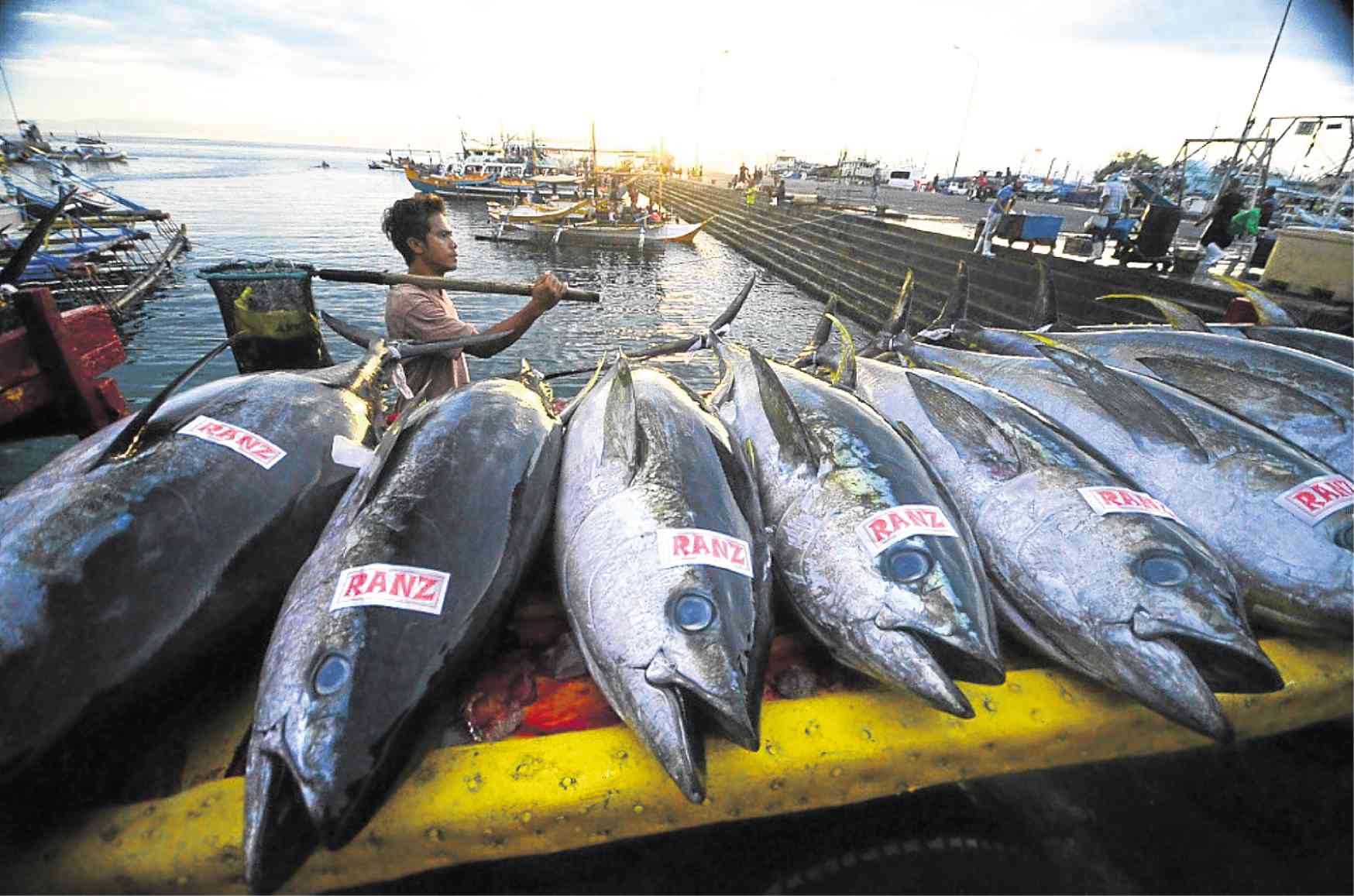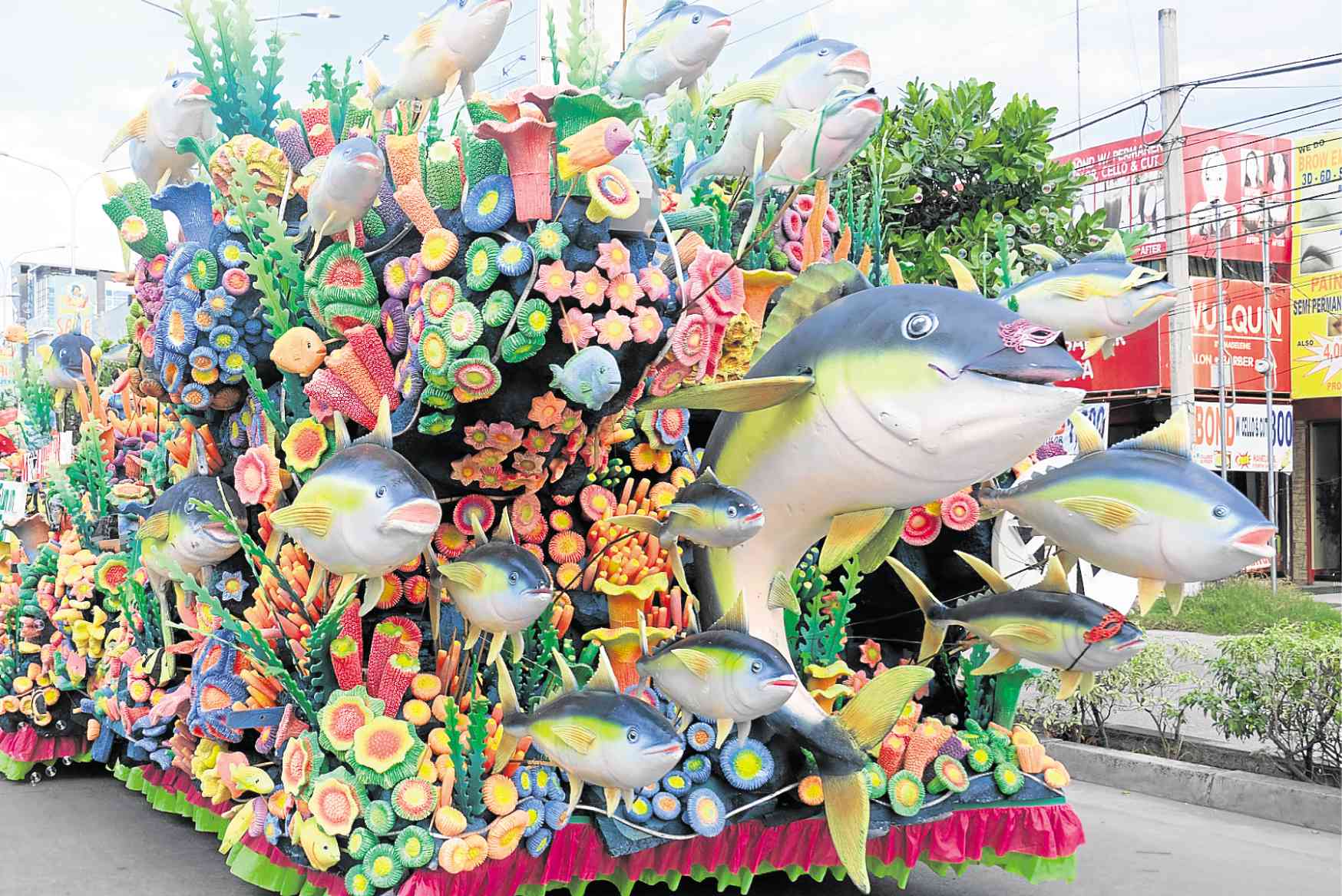Tuna catchers decry raw deal on payment

Photo shows freshly caught tuna, classified as export quality, at General Santos’ fish port. —PHOTOS BY BONG S. SARMIENTO AND ARJOY M. CENIZA
GENERAL SANTOS CITY — After spending a month at sea with other tuna catchers, Esmeraldo Asombrado returned home to his family in General Santos City with P35,000 in hard-earned cash.
The 53-year-old fisherman was not happy with the fat pay, however, though it was more than threefold the region’s minimum wage for the agriculture sector of around P9,000 monthly or P290 daily.
The volume of tuna that Asombrado caught fetched P185,000 at the General Santos fish port, from where they were sold and shipped fresh and chilled to markets in Japan and the United States at much higher prices. His P35,000 take-home pay was only a fifth of that price.
“We put our lives at risk in the high seas to catch these high-value tuna, but at the end of the day, we earned the least,” Asombrado told the Inquirer on Sept. 5, as the city hosted the 20th National Tuna Congress.
Asombrado, who is a “pasahero” (passenger), or fish catcher in the handline sector of the tuna industry, attributed his “disproportionate income” to the unregulated sharing scheme imposed by owners or operators of the fishing fleet. About 40 people, including the boat captain and crew members, join the fleet.
Article continues after this advertisementThe pasaheros use hook-and-line gear in going after tuna on board dozens of “pakura,” or smaller boats that accompany the fleet’s mother vessel. They venture farther out in the Pacific and Indian oceans.
Article continues after this advertisement4:1 sharing scheme
They are paid under a sharing scheme called “nilima,” or a 4:1 ratio, in favor of the fleet owner. The scheme varies depending on the owner, but before any income is to be divided, the owner first deducts expenses for the fishing expedition, including the “bale,” or cash advance that the pasahero usually leaves as allowance to his family.
According to industry estimates, fuel accounts for 60 to 70 percent of the total cost of a fishing trip in the handline sector.
Another fisherman, Joel Guindulan, who catches tuna in Philippine waters in a small 3-ton fishing boat, supported Ambrosado’s appeal to regulate the income-sharing scheme. In his case, the boat owner gets twice the value of the catch after deducting the costs of expedition.
“The situation out there in the high seas is difficult and unpredictable. Our lives are at stake,” he said. Sometimes, he pointed out, they would suddenly encounter waves higher than a basketball ring and backboard.
The tuna industry employs some 137,000 people in General Santos, touted as the “Tuna Capital of the Philippines.” Of this number, some 71,000 are engaged in handline fishing, usually catching yellowfin tuna, which are shipped to markets and restaurants abroad.
The rest of the fishermen, or 65,250, are into purse seine and ring net fishing, which targets skipjack tuna needed by the canneries. Six of the country’s seven tuna canneries are based in General Santos.
Last year, yellowfin tuna unloaded in the city reached 106,000 metric tons, up by 2.57 percent from the previous year, industry data showed.
Close to 2,000 fishing vessels were registered with the Bureau of Fisheries and Aquatic Resources in the region as of August 2016, records showed. Most of the vessels, or 94 percent, are owned by small- and medium-scale operators.
Buyer’s market
At the fish port complex near the heart of General Santos, the buyers, not the sellers, usually dictate the prices of large, mature tuna caught by the handline fishermen. This has prompted Asombrado to suggest the imposition of regulations on the market price of tuna to help uplift the lives of small fish catchers.
“It has always been a buyer’s market here. The producers have no influence over the pricing,” said Raul Gonzales, spokesperson for the Alliance of Tuna Handliners.
Gonzales called on the Department of Agriculture to check and intervene, if the need arises, in the buying price of large fresh tuna.
More importantly, the alliance has supported the clamor of handline fish catchers to standardize the sharing scheme. It is against the regular payment scheme because of the uncertainty in engaging in passive fishing.
‘Passive’ fishing method
Gonzales, who operates a handline fishing fleet, described the handline fishing method as “passive,” unlike the “active” one employed by large-scale operators using purse seine and ring nets.
It has been “a time-honored tradition between the boat owners and the fish catchers even before the tuna industry started to boom (beginning in the 1970s). They did not talk about regular salary because of the uniqueness of the sector,” he said.
He said the sector should not be covered by an order of the Department of Labor and Employment setting the minimum wage, holiday and premium pay, overtime pay, night-shift differential and other labor benefits, such as health insurance, housing and social security contributions.
Department Order No. 156-16, issued by then Labor Secretary Rosalinda Baldoz, is expected to be implemented this year.
Gov’t attention
Usually, the more tuna the fisherman catches, the bigger his pay is. Without a catch, the fisherman goes home with an empty pocket, weighed down still by his debt to the boat owner for financing the expedition.
Currently, the fisherman gets only 20 percent of the total value of his catch.
“I believe it is high time that we standardize the sharing system so that the fish catchers will know what to expect regarding their take-home pay no matter who owns the boat that they will board,” Gonzales said.
He noted the government’s growing attention to the handline sector, citing, among other initiatives, the designation of several tuna conservation zones in the country exclusively for the use handline fishermen.
For the first time after 20 years, the marginalized tuna fishermen were accorded a Fisher’s Night on Sept. 4 during the celebration of the annual Tuna Festival in General Santos, in recognition of their contribution to the growth of the city.

BOUNTY OF THE SEA General Santos City, the country’s “tuna capital,” acknowledges the local fishing industry as a major economic driver through a festival that honors fishermen and features street dancing and float parade.
Night of fun
Hundreds of fishermen and their families were treated to a night of food and fun, initiated by the Oblates of Notre Dame (OND) with the support of local government officials.
“If there are no fishermen, we would not have fish on our table,” said Sister Susan Bolanio, executive director of the OND Hesed Foundation Inc.
The foundation administers the Apostleship of the Sea, which has been managing the Stella Maris Seafarers’ Center at the General Santos seaport since 2006. The center has been helping distressed, poor tuna fishermen, including those jailed for illegal fishing in Indonesia.
Councilor Brix Tan, chair of the city council’s committee on fisheries, marine life and aquatic resources, said Bolanio earlier broached the idea to organize a Fisher’s Night for fishermen in the city during the weeklong tuna festival.
“The small tuna fishermen deserved to be recognized. They are an instrumental part for the growth of our tuna industry,” said Tan, a scion of a tuna fishing tycoon.
Asombrado said he hoped the government would “look into this longtime practice to give tuna catchers their fair share.”